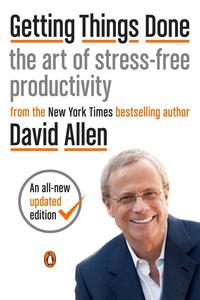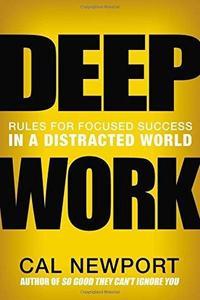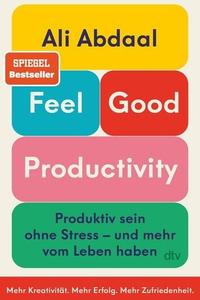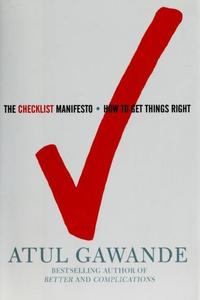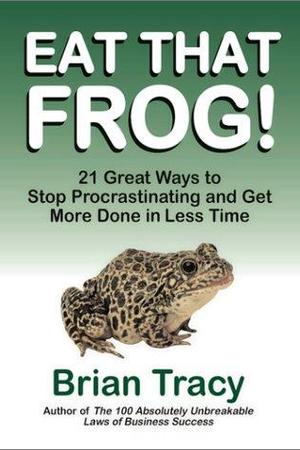
Eat That Frog! by Brian Tracy: Summary & Notes
by Brian Tracy
Related reading: Getting Things Done Summary, Deep Work, Feel-Good Productivity
In One Sentence
Do your most important, challenging task first thing in the morning—"eat the frog"—and the rest of the day becomes easier.
Key Takeaways
- If you must eat a frog, do it first thing in the morning
- If you must eat two frogs, eat the ugliest one first
- Plan each day the night before
- Apply the 80/20 rule: focus on the vital few tasks
- Consider the consequences: important tasks have big outcomes
- Prepare thoroughly before you begin
Summary
A classic in the world of productivity, this book delivers on providing clear, concise guidelines on how to get more done.
A short read to begin with, most of what you’ll need to remember can be gleaned from the summary at the end.
Read it once, and then keep the short list of principles nearby to refer back to.
Who Should Read This Book
- Chronic procrastinators
- Anyone who avoids important tasks
- People who feel busy but unproductive
- Those wanting simple productivity advice
FAQ
What does "eat that frog" mean?
Your "frog" is your most important, most dreaded task—the one you're most likely to procrastinate on. Eating it first means doing that task first thing in the morning before anything else. This ensures your most important work gets done.
📖 Chapter-by-Chapter Breakdown
Click to expand the full detailed notes for every chapter →
📖 Chapter-by-Chapter Breakdown
Click to expand the full detailed notes for every chapter →
Notes
- Ask successful people what they do, then do the same things until you get the same results.
- The ability to focus on your single most important task, to completion, is the key to great success. That is the central insight of this book.
- Another key to success: action. Always pushing to take the first step towards accomplishing a goal as quickly as possible.
- In a world that is changing faster than ever before, these skills are even more important than ever before.
- The term “eat that frog” comes from Mark Twain, and the idea is this: tackle your biggest, most important task first, every day.
- Vagueness is a big cause of procrastination. The solution is clarity. Get better clarity by thinking on paper, writing down what you want, what needs to be done, and the first steps to get there.
- Then, take action immediately on the first step.
- Plan your day in advance, and always work from a list. If something new comes up, don’t change your plan, add it to the list.
- Some lists you should keep: a master list with everything, a monthly list for the upcoming month, a weekly list for the upcoming week, and a daily list for what you’re going to do tomorrow.
- Apply the 80/20 principle everywhere. 20% of your activities will provide 80% of the results. Focus on finding those activities.
- Avoid the temptation to clear up small things first.
- Long-term thinking improves short-term decision making. If you can put things in a long-term context, and think about those consequences, you can choose what to work on in the short-term.
- Law of Forced Efficiency: “There is never enough time to do everything, but there is always enough time to do the most important thing.”
- Do first things first and second things not at all.
- Procrastination can be useful; you have to procrastinate on something, so make sure it’s the small tasks.
- Say no to anything that is not a high-value use of your time and your life.
- We all have key result areas where we must deliver to do our jobs well. Your weakest key result area is what limits your success.
- Most people, when forced to write down their 3 most important goals, have one in each of the following categories: finance & career, family or relationship, and health & fitness.
- 85 percent of your happiness will come from your relationships with other people.
- It is the quality of time at work, and the quantity of time at home that matters.
- A good workspace is critical to getting things done quickly. Make sure you have everything you need before you start.
- Continuous learning is a requirement for success in every field.
- There is almost always one limiting factor which sets the speed at which something can be accomplished. You need to figure out what it is, and remove it. Continuously.
- Pretend that you must finish all your most important tasks in one day. How does that change what you work on? How does it improve your urgency?
- Go to bed by 10pm each night and take one full day off per week.
- Eat high-protein, low-carb, and avoid sugar. Exercise 200 minutes per week.
- Become an optimist and talk to yourself as if you were a cheerleader: “You can do it!”
- Refuse to complain about your problems. Keep them to yourself.
- Technology must be a tool for you, not something that controls you. Avoid it if it’s not helping you get your most important task done. Avoid distractions as much as possible.
- Carve out big chunks of undisturbed time during which you can get things done. Creating these chunks first thing in the morning can have a huge effect on your overall productivity.
- Momentum Principle of Success: though it may take tremendous amounts of energy to overcome inertia and get started initially, it then takes far less energy to keep it going.
- To get started, just repeat “Do it now! Do it now! Do it now!” to yourself.
- Once you begin a task, resolve to continue it until it is finished. Stopping and starting over and over is far less productive.
- “Every great achievement of humankind has been preceded by a long period of hard, concentrated work until the job was done.”
